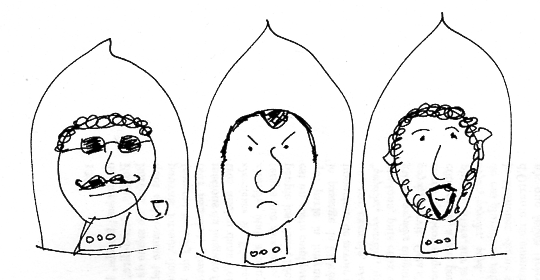I am profoundly grateful to La Gigi, for asking this question, which has brought together three of the most fascinating personalities in living memory:

I am also profoundly grateful to those who have already speculated about why on earth I would be so relentlessly fascinated by Nixon, because if they are, then they’re still talking about me!!
Even if they’re getting it wrong.
Let’s run through the speculations, shall we?
SPECULATION 1.
When I was in Atlanta last year, I mentioned my fascination to one of my wife’s former colleagues I met there.

Note: May not be an accurate depiction of my wife’s former colleague in Atlanta.
When I mentioned my relentless fascination, and that my wife and I would like to make the pilgrimage to Yorba Linda one day, the former colleague asked excitedly:
“Are you a conservative?”
No, sir. No I’m not. I’m Australian, after all.
Do conservatives even claim Nixon as one of their own any more?
SPECULATION 2
Benjamin Thomas:
Besides the fact that he was a great bowler?

He’s looking a lot more informal than I gathered; I thought he always bowled in a tie.

But then, I haven’t seen The Big Lebowski yet, where the first pic features.
SPECULATION 3
I’ve started following Tom Ramsay as an echo-chamber antidote, on the recommendation of Clarissa Lohr. I A2A’d him as an icebreaker.
I might need to revisit my choice of icebreakers.
Well this is the first I’ve heard of this particular, um, passion. So I am completely going out on half a limb with this A2A…
Are you the son of Deep Throat? ;P
To the best of my knowledge, I am not related to Mark Felt.
Now, if all the theories are wrong, and Stavros Nicholas was in fact taking time off from running a fish & chip shop in Launceston, Tasmania to meet Bernstein & Woodward in some garage in DC, well, I admire his stamina…
SPECULATION 4
Uri Granta has done his research, bringing up the Greek angles of Spiro Agnew, and the infamous moneybags Tom Pappas (Τομ Πάπας – Βικιπαίδεια; it is so… weird reading about him in the Greek Wikipedia).
Uri has also done his research with the Nixon–Whitlam collision course, a subject I am infuriated that I know less about than I should.
Uri’s third para of course is the right answer, and I’ll come back to that.
SPECULATION 5
Michaelis Maus, welcome to my nightmare. Mwa. Ha. Ha. And thank you for chiming in!
Your vid was by Flight of the Conchords. I definitely should put them on the list, but alas, I stopped consuming popular culture a long time ago. But bless you for including them in your answer. God they’re good. I’ll delight in taking credit for them, as all Australians do with all good things that come out of New Zealand.
Dr Nick appreciates that Michaelis is, to use an infantilising classification scheme, Chaotic Neutral (Alignment (Dungeons & Dragons)), which is why Tricky Dick is a “a real, consistent nihilist after [his] own heart”. (He is also grateful that Michaelis has remembered his little “I’m arrogant enough to demand to be addressed as Dr” aside!) OTOH, I’m Lawful Good, with the Lawful exceeding Good—so much so, that I consciously try to force myself to be Lawful Neutral, all the time.
If you get my meaning.
Dr. Nick, to that effect, seems to appreciate the complexities of oft-caricatured humans.
Yes, Michaelis. You get my meaning. In fact, my first glance reaction was “yeah, but it’s more than that”; but come to think of it, reading your answer again, no, it was that.
Let me though trace my own journey of Nixon appreciation.
STAGE 0
I was 3 during Watergate, and living in Launceston, Tasmania. Little knowing that my dad was couriering information to Bernstein and Woodward, apparently.
My earliest political memory of anything involved Reagan. So Nixon is ancient history to me, in a time that already had the Iran-Contra affair. I did not experience the visceral sense of betrayal that Americans did with Watergate; I took it as given.
So Nixon does not viscerally offend me, the way it might someone who lived through his fall.
What I knew about Nixon until I was 17 was Watergate, and he’d occasionally show up on TV as a pundit. That was it.
STAGE 1
Stage 1 was hearing the premiere on the radio of Nixon in China in 1988. Nixon in China is an amazing opera, with an amazing libretto, that has stood the test of time.
Thing is, though, that the composer and librettist were both stereotypical Berkeley lefties, so they made a point of overcompensating in their depiction of Nixon. They did not want to make him a villain, so they tried to make him a hero. They didn’t pull it off: the real hero of the piece is Zhou En-Lai.
You see a Nixon comically out of depth in the opera, but also a Nixon strategising and reminiscing and nervous and genuinely hopeful. What you see only in passing, though, is the darkness in Nixon; just a couple of minutes, really—“The rats begin to chew the sheets” in the first scene, “Some men you cannot satisfy” in the last. It’s an interesting depiction, but a little too positive to be fascinating.
STAGE 2
1995, I caught Oliver Stone’s Nixon (film) on TV.
That’s what did it.
Nick Nicholas’ answer to What are your favorite movies and why?
I looked high and low for the DVD for years afterwards. Over a decade in fact.
Yes, it’s fictionalised and psychobabblised and operatic and conspiracy-theorised. And having read a lot of Nixoniana since, I still think that artistically, it is essentially true. It’s not a documentary, but that’s not what it needed to be.
STAGE 3
Stage 3 was getting together with another Nixon fan. Our bonding over Nixon is mentioned in my answer above. One of Tamar’s first presents to me was Volume I of Ambrose’s biography; and propelled by it, I’ve ended up reading most of Melbourne University’s holdings on Nixon.
Nick Nicholas, why are you so fascinated with Nixon?
He was a multi-faceted, complex man.
- Was the smartest man in decades in the White House. And turned the White House into a protection racket, with the dumbest enforcers imaginable.
- Used politics as a cudgel, but genuinely thought he was doing good for the world.
- Did good for the world with detente and China, but also did evil for the world with using SALT as a political football, and undermining Johnson on ending Vietnam.
- Had genuine outreach with Martin Luther King as a Vice President, but invented the Southern Strategy.
- Did great things for Native Americans—by accident, because that was Ehrlichman’s pet project, not his; and Ehrlichman was on his side, so of course he’d defend him against Congress.
- Nursed lifelong paranoias against the elite, but the elite really was out to get him, because of the excesses his paranoia caused.
He had a bushelful of hamartias, tragic flaws. The tragic hero doesn’t have to be Good. He just has to have potential to be better than his hamartias allow.
And I have the luxury of regarding Nixon from a distance, as a tragically flawed president, rather than as a visceral offence to my own polity and founding myths. Because I was 3 during Watergate, and living in Launceston, Tasmania.




